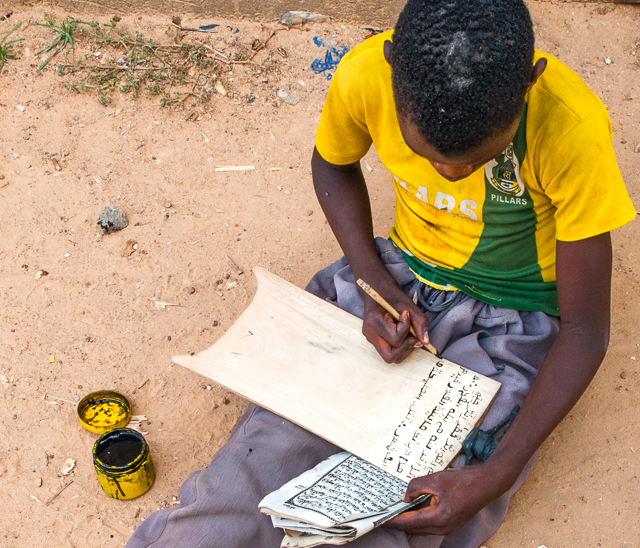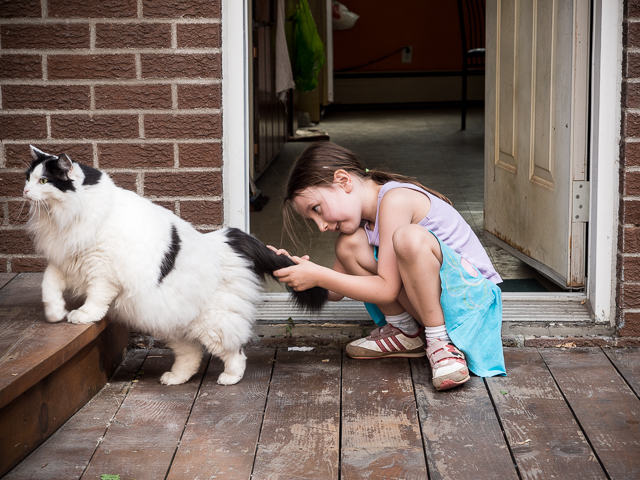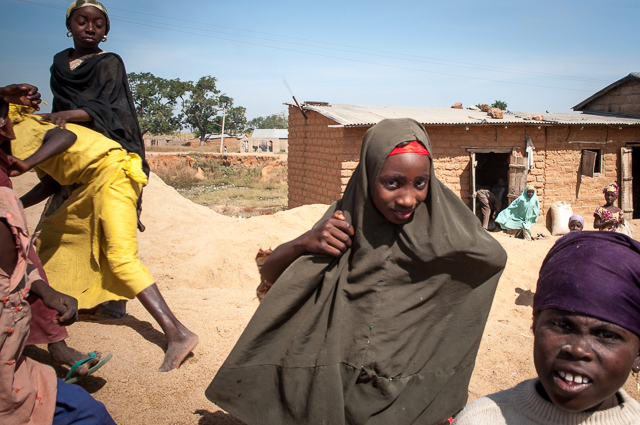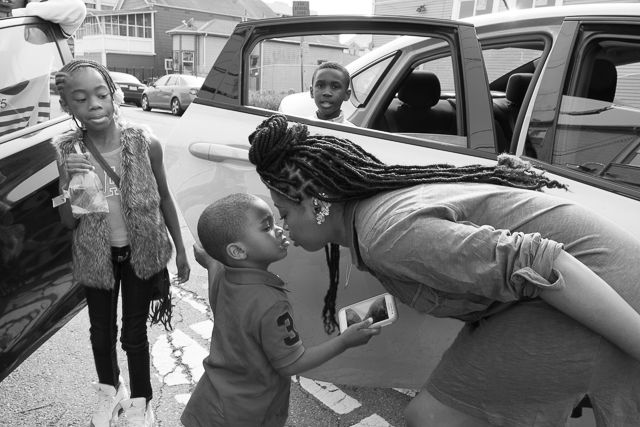I have no opinion about KinderGuides, which publishes picture books based on works of classic literature designed for 6-10 year-olds. So far, they’ve got “On the Road,” “The Old Man and the Sea” and “Breakfast at Tiffany’s.” Their version of Kerouac classic does not mention drinking, drug taking, casual sex, unacknowledged homoerotic thoughts, or unsafe driving.
It is, apparently, like an adventure story, with some talky guys involved in G-rated hijinks. I haven’t read it, so (as I say) I have no opinion about it. As to whether classic novels should be repurposed as kid’s books — well, if I came out against it, I would also have to oppose movie versions of books, television mini-series based on books, satire and pastiche, interpretive dance and murals, and so forth. And I don’t oppose those things, so I cannot oppose kiddie books based on adult favorites.

Apparently, the issue of whether Holly Golightly was a prostitute (and she was, of course) is not brought up in little people’s version of “Breakfast at Tiffany’s,” so apparently she’s just a high-spirited girl with an independent income. Who…well, it’s hard to see how a version of the story without the sexual tension would interest anyone, much less a seven-year-old girl. But what do I know? If I knew how to write successful children’s books, I’d be living on Maui, importing celebrities for raucous games of strip poker, and making personal appearances with stuffed toys bearing the likeness of Maybe Henry, the hero of my ghost/adventure series The Maybe Gang.
“The Maybe Gang Meets The Headless Horseman” has been translated into 13 languages. But I digress.
Nor do I have an opinion about Cozy Classics (I am not making this up), the book series that reduces classics to just 12 words. (Real example, for “War and Peace”: “Soldier friends run dance good-bye hug horse boom! hurt sleep snow love”). This seems more like a conceptual art book for adults rather than a real kid’s series, but apparently many parents are buying them and leaving them around the playroom for their offspring to find.

Still, not everyone was happy. One Amazon reviewer described the Cozy take on “Jane Eyre” as “weird, dark and not the most appropriate for kids who are reading board books.”
Well, (a) it’s a book in which a madwoman locked in the attic is a central plot point, so what were you expecting? and, (b) who says kids don’t like dark books? Some parents seem to have forgotten what it was like to be a child. Sure, there are innocent childhood delights, and wonder at unexpected things that adults are too jaded to appreciate, but there’s also fear, lots and lots of fear, and many mysterious threatening things, some of which can be put down to wind during a rain storm, and some of which can be put down to abusive drunk dangerous parents.
We don’t live in a totally sunny world, and our kids live in the same world we live in. Nothing can protect them from darkness and weirdness, certainly not dark weird people like us. The Grimms were right: Children need stories that tell them they are not crazy, that homicidal wolves and wicked stepmothers are indeed part of the landscape, whatever Sesame Street says.
What did I love most when I was 7 or 9? Edgar Allen Poe stories, for one — “The Pit and the Pendulum” I found particularly enthralling, and when I realized what was going on in “A Cask of Amontillado,” I was genuinely thrilled. Plus lots of gore and soupçons of sex (sex!) in science fiction and murder mysteries; hints about dark secrets as yet unexplored. My whole life was sort of a murder mystery; I kept trying to figure out what happened to my dad.
My, that turned weird all of a sudden. Proving my point.
Lemony Snicket understands that. J.K. Rowling understands that. What do people think is going on in Harry Potter, anyway? A very evil entity kills Harry’s parents, and he spends seven books seeking bloody revenge. Plus, there’s Stephen King. He writes books that young people read, whether they are appropriate or not.
(My experience: Calling something “inappropriate” is a sure-fire marketing tool. Big cover blurb for “Flesh Eating Zombies of the Apocalypse” goes like this: “It’s inappropriate! — Your parents.”)

May I make a serious point? I think parents are way too fretful about what their kids read. With some obvious exceptions (let ’em watch pornography in secret, as God intended), parents should just open the keys to the library and let ’em browse. And when the kids hit the Internet, it will be time to acquaint them with the real facts of life — people lie. Unwitting people repeat the lies. Don’t be caught! Think for yourself! And when your kid asks you for cites on some unsupported piece of bullshit you’ve just promoted, you can congratulate yourself on having done your job well.
If your kid is a smart-ass, so much the better.
And finally: What you do when your kids are around is far more important than anything they read. Inevitably, it is your behavior they are copying — not the behavior you recommend, but the things you actually do. The apple doesn’t fall very far from the tree, and you’re the tree. Water, prune, fertilize, don’t commit murder. The metaphor just broke down. Writing is hard.
The way to make sure that your kid is a good person is to be a good person yourself. Or as Cozy Classic might put it: Child watch kindness generosity imitate help homeless heal kiss grandma read books!
*********************
A whole damn column without Donald Trump. That felt good, didn’t it?

Photography by Tracy “I have too many children!” Johnston
Useful services by Michelle Mizera

In my pre-TV childhood in the late Pleistocene reading was my main entertainment. I read masses of inappropriate books and don’t think they did me any harm. I know there was one that caused me nightmares and I woke up screaming. My parents found that I’d been in the middle of reading some kind of ghastly book in which the lord of a medieval manor was furious with a pageboy who had spilled a drink – he had skewered him with his sword and rammed him into the huge fireplace of the great hall till he died in agony! That one they did take away from me!
LikeLike
Oh oh what was that book?
LikeLike
Cozy Classics read like Donald Trump’s book report.
LikeLiked by 1 person
Seems there are 2 ideas here.
One is whether a tale should be told to the young and the other is whether a tale should be reduced to 12 words or fewer, or to have important plot elements removed.
I am no longer a young, impressionable child and it would take years of expensive therapy to fabricate false narratives tracing deep-seated feelings about obscure plot lines I was exposed to.
I think children need interactions to help them clarify as they go.
Sure, we know people lie, but some people believe that the “truth” is just another lie.
Do we remember that Disney animated features were terrifying?
See one in the Big Screen sometime.
Did we survive?
Can we compare cultures by how they treat story-telling to the young?
Hmm…
What ARE today’s Fairy Tales?
The ones from yore served various purposes – illustrative and teaching concepts.
Are we losing the concept of Legend?
So many things to think about when you don’t think about “T.”
LikeLike
What are board books?
LikeLike
As a child I loved books about baseball players, both fictional and real. One day I wandered over to the adult section of library and checked out, “The Natural,” Real swearing and real sex!! You can bet I shared it with all my neighborhood buddies.
LikeLike
Quite right about opening library and letting kids wallow. My father did that and I educated myself in large part from his library (and of course the public library too). And it was not the overtly improving books that made the most difference. The books that taught me the most, beyond the encyclopedia, were the cartoon books: old New Yorker books, books from Punch and Yank and The Sad Sack. And Cartoon Cavalcade
(1943), edited by Thomas Craven, which collected American cartoons back to the turn of the century, and The American Past (1947), by Roger Butterfield, which was not
all cartoons but contained many of them going back to 1775. He also had humorous books by Robert Benchley and James Thurber and Will Cuppy, among others. These were all full of unexplained context – a New Yorker cartoon from 1930 or a Thomas Nast set piece from the 1870s – is often not transparent to a 12-year-old boy in 1956 – and to understand them I had to learn about the world. It was better than homework because it was completely voluntary, fueled only by my own curiosity.
There was one exception to the open library rule. My father was a doctor, and he said please not to read his medical books because I’d think I had every disease. That exception seemed so reasonable (as opposed to an enticing but unexplained prohibition) that I obeyed it completely and without resentment.
LikeLiked by 1 person
Please write like this five times a week every week every year… for free!
LikeLiked by 1 person
Why stop at five days a week? Since it’s free, we can afford to have Jon do it every day, including Sundays and holidays!
LikeLike
I am so happy that I get to read your “columns still.I look forward to each one. I appreciate all your insightsand perspectives on subjects. Thank you!Heidi Heidi Mueller Real Estate Broker 415-722-2076 heidi@sfrelo.com CABRE: 00974036 My Blog
From: Jon Carroll Prose To: heidi@sfrelo.com Sent: Thursday, January 12, 2017 1:15 PM Subject: [New post] Suffer the little children #yiv4280205075 a:hover {color:red;}#yiv4280205075 a {text-decoration:none;color:#0088cc;}#yiv4280205075 a.yiv4280205075primaryactionlink:link, #yiv4280205075 a.yiv4280205075primaryactionlink:visited {background-color:#2585B2;color:#fff;}#yiv4280205075 a.yiv4280205075primaryactionlink:hover, #yiv4280205075 a.yiv4280205075primaryactionlink:active {background-color:#11729E;color:#fff;}#yiv4280205075 WordPress.com | joncarrollprose posted: “I have no opinion about KinderGuides, which publishes picture books based on works of classic literature designed for 6-10 year-olds. So far, they’ve got “On the Road,” “The Old Man and the Sea” and “Breakfast at Tiffany’s.” Their version of Kerouac class” | |
LikeLike
I like this one:
https://www.wired.com/2013/08/my-first-kafka/
and so did my three grandsons aged 2-5.
But I agree with David above that the best thing is just to let children loose in a library (not just the Children’s or YA sections– most of those books are annoyingly “improving”). Also would love to know more about the skewering and roasting of the pageboy from Phyllis’s comment.
LikeLike
Question: Does a reply here get public exposure as the blue Comment bar would seem to do? How do the avatar/symbols get assigned/chosen? Is a pseudonym allowed? I have been allowed one on the back country pilots.org as Trimtab where I write short “Oh Shit!… There I was” stories with a lesson buried in them.
Got real interested with your previous piece about getting involved.
I was directed here by Will Murray during my grief and ranting about your “retirement.”
Nufffornow Hopefully Chris C
On Thu, Jan 12, 2017 at 1:15 PM, Jon Carroll Prose wrote:
> joncarrollprose posted: “I have no opinion about KinderGuides, which > publishes picture books based on works of classic literature designed for > 6-10 year-olds. So far, they’ve got “On the Road,” “The Old Man and the > Sea” and “Breakfast at Tiffany’s.” Their version of Kerouac class” >
LikeLike
I’m going to ask Michelle to get involved here.
LikeLike
Surely you oppose Kiddie Books based on Murals!
>
LikeLike
Alas, I cannot
LikeLike
“As to whether classic novels should be repurposed as kid’s books — well, if I came out against it, I would also have to oppose movie versions of books, television mini-series based on books, satire and pastiche, interpretive dance and murals, and so forth. And I don’t oppose those things, so I cannot oppose kiddie books based on adult favorites.”
I’m not so sure your logic holds in this passage. When somebody — young or old — views a movie, television mini-series, satire/pastiche or interpretive dance/murals based on a book, they know full well that they’re not reading that book. But when a very young child sits down with one of these repurposed, homogenized, and thoroughly de-fanged literary abominations, he/she could believe he/she has read the real thing, and thus not bother with the original a few years later.
“I’ve already read that,” this theoretical older-young person might say, then go back to thumb-talking on his/her Iphone.
Granted, the older-young person curious enough to investigate one of the originals may well have the sort of eye-popping, mind-blowing experience that could lead to a deep dive into all those previously read classics, and thus develop a healthy distrust of institutionalized, denatured pabulum… but I fear that may be the exception.
So yes, I think you can in good conscience oppose kiddie books based on adult favorites. I do, and I’ve never even read one… which probably makes me — in my own way — just as ignorant and uninformed as the average Trump voter.
PS: I wonder how the 12 word version of “Lolita” might read…
LikeLike
Humbert Humbert love love Lolita Lolita car America Dolores Quilty Quilty! Pregnant
LikeLike
Jon, I just watched a great documentary called “Far Out Isn’t Far Enough: The Tomi Ungerer Story. Watch it if you haven’t already!
LikeLike
I suppose we should be glad kids still read, but it seems to me there’s quite enough for them to read without plundering the classics…and that leads me to cutesy Disney versions (with pop music and catchy new character names) of Grimm and Hans Christian Andersen. Cuckoo eggs other birds’ nests bad idea.
LikeLike
People have been plundering the classics since the classics were written. And a lot of the Disney movies, particularly early Disney movies, were great art. Snow White. Dumbo. And, while we’re at it, Frozen.
LikeLike
I was the only kid on my block who knew that Frankenstein wasn’t the monster’s name.
LikeLike
It’s no big deal. According to almost anyone under the age of 30, the only people buying/reading old-fashioned wordy books are over the age of 65 and prone to yelling, “Right on!” “Sock it to me” and “Get off my lawn!
LikeLike
Although, of course, independent bookstores are thriving. The decline of print has been somewhat overestimated. And I think that characterization of young people is unfair, and perhaps symptomatic of lack of contact with young people. A whole lot of them read, and they don’t think of us in particularly stereotypical terms, unless we act in stereotypical ways. They may of course just ignore us, but that’s not because they don’t read.
LikeLike
My mother was a highly educated teacher. We had quite a number of books in the home as I grew up. Biographies and classics.
My mother provided me with a number of books that I’m sure were not considered appropriate for my age.
I read tons of books as a child and I know the ones that had the most impact on me were the ones that she gave me that were above my age level.
Dummying down books is not a good idea. I fear it’s too late now, that book reading for young people is largely outdated.
I love and appreciate your posts a great deal Jon, thank you.
Vennie
LikeLiked by 1 person
Thanks, Jon. I think Nabokov would approve your Lolita. Two stories knocked me out as a kid. The first was “Christmas Carol” which I somehow stumbled into in second grade before the various cartoon and live action versions became ubiquitous. Then in 6th grade I found “1984.” Still the greatest and most chilling ending in English. “He had won the victory over himself. He loved Big Brother.” I was channel surfing a few years ago when I still wasted money on cable and got hooked by the 1984 movie version of “1984”. I remember the tension as I wondered how on earth they would deliver the last lines. The only thing I could think of was voice over narration or some type of scroll with the end credits. Instead they did what I would never have considered. They skipped it. But what did I expect from people so literal-minded that they actually filmed the movie “1984” in 1984. Alas. Luckily for us there are hard copies of the book everywhere.
LikeLike
I had an LP of Basil Rathbone reading “A Christmas Carol”. Great stuff. At around the same time: “Peter and the Wolf.”
LikeLike
You know that Basil Rathbone, Claude Rains, Herbert Marshall and Ronald Colman all served on the Western Front in the London Scottish Regiment in WW1? Basil Rathbone apparently suffered what we would now call PTSD, worsened by terrific guilt over his younger brother’s death in action. Claude Rains was gassed and was nearly blind in one eye the rest of his life. Marshall of course lost one leg. Although he taught himself to walk with an artificial leg, whenever he had to walk or run for a movie it was done by a stand in. Colman was wounded in one ankle by shrapnel early on in the War and had a pronounced limp the rest of his life.
LikeLiked by 1 person